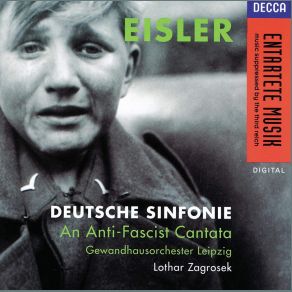Eisler: Deutsche Sinfonie
Download links and information about Eisler: Deutsche Sinfonie by Gewandhausorchester Leipzig, Annette Markert, Peter Lika, Ernst Senff Chor Berlin, Matthias Goerne, Lothar Zagrosek, Hendrikje Wangemann, Gert Gutschow, Volker Schwarz. This album was released in 1995 and it belongs to genres. It contains 11 tracks with total duration of 01:04:59 minutes.

|
|
|---|---|
| Artist: | Gewandhausorchester Leipzig, Annette Markert, Peter Lika, Ernst Senff Chor Berlin, Matthias Goerne, Lothar Zagrosek, Hendrikje Wangemann, Gert Gutschow, Volker Schwarz |
| Release date: | 1995 |
| Genre: | |
| Tracks: | 11 |
| Duration: | 01:04:59 |
| Buy it NOW at: | |
| Buy on iTunes $9.99 | |
| Buy on Amazon $9.49 | |
Tracks
[Edit]| No. | Title | Length |
|---|---|---|
| 1. | Deutsche Sinfonie, Op. 50: Präludium | 6:55 |
| 2. | Deutsche Sinfonie, Op. 50: an die Kämpfer in den Konzentrationslagern | 4:10 |
| 3. | Deutsche Sinfonie, Op. 50: Etüde für Orchester | 3:11 |
| 4. | Deutsche Sinfonie, Op. 50: Erinnerung (Potsdam) | 3:55 |
| 5. | Deutsche Sinfonie, Op. 50: in Sonnenburg | 2:49 |
| 6. | Deutsche Sinfonie, Op. 50: Intermezzo für Orchester | 4:19 |
| 7. | Deutsche Sinfonie, Op. 50: Begräbnis des Hetzers im Zinksarg | 5:29 |
| 8. | Deutsche Sinfonie, Op. 50: Bauernkantate | 7:05 |
| 9. | Deutsche Sinfonie, Op. 50: Arbeiterkantate | 15:01 |
| 10. | Deutsche Sinfonie, Op. 50: Allegro für Orchester | 10:48 |
| 11. | Deutsche Sinfonie, Op. 50: Epilog | 1:17 |
Details
[Edit]Performed by various vocal soloists with the Ernst Senff Chor Berlin and the Gewandhausorchester Leipzig conducted by Lothar Zagrosek. Part of London's Entartete Musik [Degenerate Music, music suppressed by the Third Reich] series. At various times dubbed an "anti-fascist cantata," a "concentration camp symphony" and an "anti-Hitler symphony," this soul-moving, humanist, provocative and important work for chorus, soloists and orchestra is in 11 sections, written for the most part from 1935 through 1957. Eight of its movements have words by Berthold Brecht, with the eighth movement also containing portions from Ignazio Silone's novel Bread and Wine (1936), who was called a "renegade" by the USSR after he condemned the show trials as a "slaughtering of the opposition." The Symphony's history can also be viewed as biographical of the composer's tumultuous life: The final movement is an "Epilogue," a plea to save children from the literal cold and the coldness of man's previous acts. ~ "Blue" Gene Tyranny, Rovi